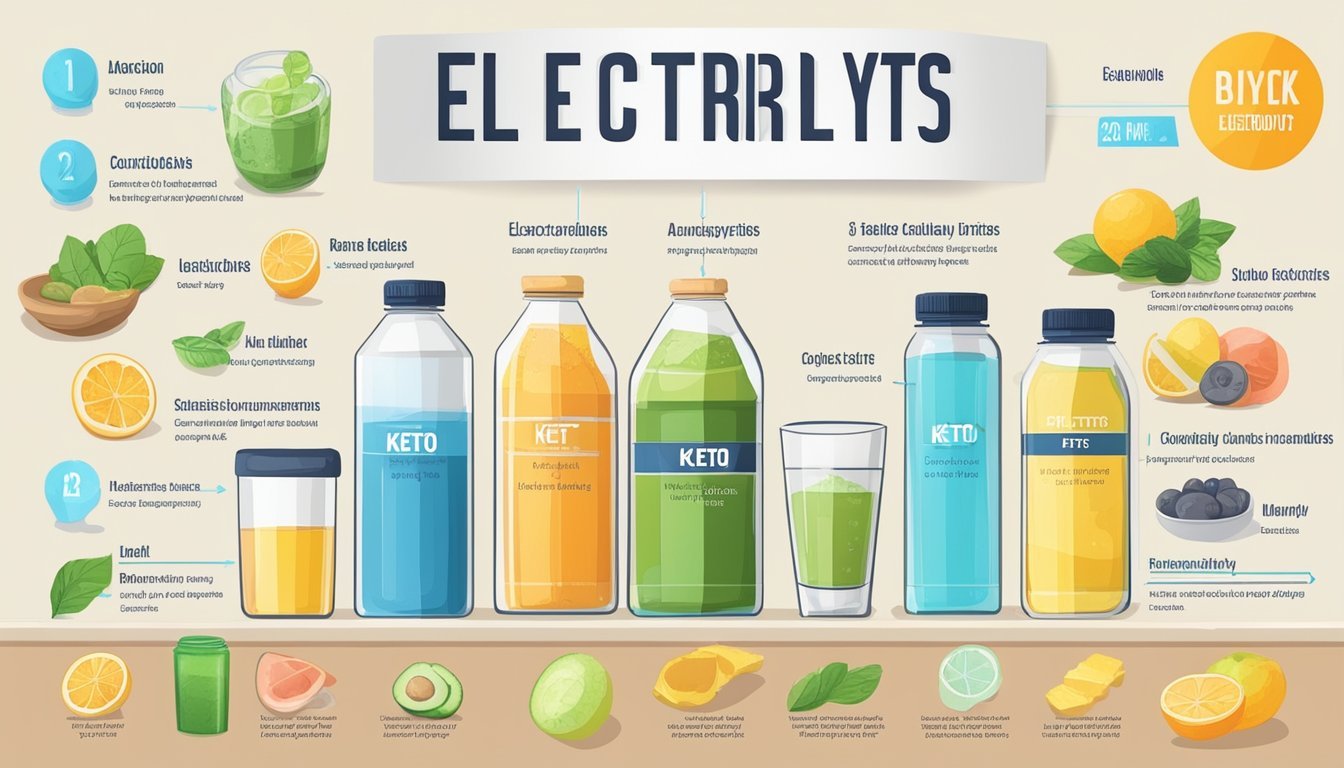Keto Diet and Electrolyte Drinks
Balancing Hydration and Nutrition
The ketogenic, or keto, diet has gained popularity as a lifestyle choice that hinges on the principle of low carbohydrate and high fat intake. By significantly reducing carbohydrate consumption, the body enters a metabolic state known as ketosis, where it burns fat for energy instead of glucose. This shift can have various impacts on the body's health and performance. A key aspect often overlooked is the maintenance of electrolyte balance, as the keto diet can alter the way the body retains and utilizes these vital minerals.
Electrolytes, including sodium, potassium, calcium, and magnesium, serve critical functions in the body such as regulating fluid balance and muscle contraction. When following a keto diet, individuals may experience changes in electrolyte levels due to reduced insulin levels and a diuretic effect, which can lead to dehydration if not properly managed. Adequate hydration is crucial for overall health, especially for those on a keto diet, as it can impact both physical performance and well-being.
To combat these challenges, keto-friendly electrolyte drinks can be a practical solution. These beverages are designed to replenish mineral levels without compromising the low-carb requirement essential to maintaining ketosis. Choosing the right electrolyte drink is important, with options available that offer the necessary electrolytes without added sugars or carbohydrates, thus supporting the diet's objectives while promoting optimal hydration.
Understanding the Keto Diet
The ketogenic diet is a high-fat, low-carbohydrate eating plan that induces a state of ketosis in the body, where fat is burned for energy instead of carbohydrates. This section will guide the reader through the essentials of the ketogenic diet, its benefits and common side effects, and the distinction between clean and standard ketogenic approaches.
Basics of a Ketogenic Diet
A ketogenic diet radically reduces carbohydrate intake, typically to 20 to 50 grams per day, and increases fat consumption. This macronutrient shift pushes the body into ketosis, a metabolic state where the body uses ketones, produced from fats, as the main energy source instead of glucose from carbohydrates.
Macronutrient Distribution:
Carbohydrates: Approximately 5-10%
Fats: 70-80%
Proteins: 20-25%
Keto Diet Benefits
They may experience weight loss due to reduced appetite and increased fat burning. Some individuals report improved mental clarity and increased energy levels. Moreover, the keto diet has been used to manage medical conditions like epilepsy and is being researched for potential benefits in other neurological disorders.
Common Side Effects
Newcomers to the ketogenic diet may experience the "keto flu," which can include symptoms such as fatigue, muscle cramps, and headaches, typically within the first week of dieting. These side effects are often a result of electrolyte imbalances due to reduced insulin levels and diuretic effects which lead to increased fluid loss.
Clean Keto Diet Vs. Standard Keto Diet
The clean keto diet emphasizes whole, unprocessed foods rich in nutrients, while the standard keto diet is less restrictive, allowing for processed foods and artificial ingredients.
Clean Keto Diet Features:
Focus on high-quality fats (avocado, olive oil)
Incorporate nutrient-dense vegetables
Limit processed foods and artificial additives
Standard Keto Diet Features:
Prioritizes macronutrient composition over food quality
May include processed low-carb foods
Easier to follow due to fewer restrictions
The Role of Electrolytes
Electrolytes are essential minerals that carry an electric charge, critical for maintaining numerous bodily functions. They particularly influence muscle function, hydration status, and the body's pH level.
Importance of Electrolytes in the Body
Electrolytes—including sodium, potassium, magnesium, chloride, and calcium—play vital roles in the human body. They are responsible for regulating nerve and muscle function, hydrating the body, balancing blood acidity and pressure, and helping rebuild damaged tissue.
Sodium helps control fluids in the body, impacting blood pressure and cellular function.
Potassium is crucial for proper muscle contractions, nerve signals, and maintaining a healthy blood pressure.
Magnesium aids in over 300 enzyme reactions, including regulating muscle and nerve functions, blood sugar levels, and blood pressure.
Chloride works with sodium to maintain proper balance and pressure of the fluids in and around cells.
Calcium is key for bone health and plays an integral role in muscle contractions, nerve signaling, and blood clotting.
Electrolyte Imbalance on Keto
When following a ketogenic diet, the body experiences a significant reduction in carbohydrate intake, leading to a drop in insulin levels and a natural diuretic effect. This can result in a substantial loss of water and electrolytes, such as sodium, potassium, and magnesium, which can cause an electrolyte imbalance. Symptoms of electrolyte imbalance include muscle cramps, dehydration, and cognitive issues.
Here are key points to consider:
A ketogenic diet can cause the kidneys to excrete more electrolytes than usual.
Supplementing with electrolytes is often necessary to prevent imbalance.
Sufficient intake of electrolytes is important to avoid detrimental effects related to dehydration and nutrient deficiencies.
Maintaining electrolyte balance is crucial for individuals on a keto diet to support their overall health and to ensure the dietary change does not lead to adverse symptoms.
Electrolyte Drinks and Keto
When adopting a ketogenic diet, maintaining a proper balance of electrolytes is crucial due to changes in fluid and mineral balance. Electrolyte drinks can support hydration and reduce the risk of imbalance.
Benefits of Electrolyte Drinks
Electrolyte drinks offer several advantages for individuals on a ketogenic diet. They help replenish minerals lost through reduced carbohydrate intake and increased water excretion. These minerals include sodium, potassium, magnesium, and calcium. Proper electrolyte intake can alleviate symptoms associated with the keto flu, like headaches, cramps, and fatigue.
Choosing the Right Electrolyte Drink
Selecting an appropriate electrolyte drink is essential on keto. Sugar-free options are preferred to maintain ketosis. The drink should provide a balance of necessary electrolytes without added sugars or artificial ingredients that could disrupt the diet. Some keto-friendly electrolyte drinks also come in convenient forms like powders or capsules.
Homemade Electrolyte Drinks
Creating a homemade electrolyte drink is a practical way to control ingredients and ensure the drink aligns with keto principles. A basic recipe might include:
Water: 1 liter
Lemon juice: 1/2 cup for flavor and a bit of natural sugar
Sea salt: 1/2 teaspoon for sodium
Magnesium: A pinch or a magnesium supplement
Other ingredients like coconut water can add potassium but should be used sparingly due to natural sugars.
Foods Rich in Electrolytes
Electrolytes are essential minerals that are vital for many functions in the body. They can be found in a variety of foods, ranging from meat and fish to plant-based sources such as vegetables and fruits. It's important for individuals on a ketogenic diet to consume foods high in electrolytes to maintain balance due to reduced carb intake.
Animal-Based Sources
Meat and fish are excellent sources of electrolytes, providing sodium, potassium, and other minerals necessary for muscle function and fluid balance. Key electrolyte-rich options include:
Fish: Particularly salmon, which is high in potassium and other minerals.
Meat: A good source of various electrolytes and should be consumed in moderation.
Plant-Based Sources
Vegetables and fruits are integral for a balanced intake of electrolytes. They are rich in minerals like potassium, magnesium, and calcium. Notable mentions are:
Avocado: Packed with potassium.
Spinach and broccoli: Both are high in various essential minerals.
Nuts and Seeds
Nuts and seeds are nutrient-dense foods that offer a substantial amount of electrolytes, making them ideal for those on ketogenic diets. They include:
Almonds: An excellent source of magnesium and other minerals.
Pumpkin seeds: High in minerals such as magnesium and potassium.
Incorporating a mix of these foods can help ensure a steady supply of electrolytes, which is particularly critical in the context of a ketogenic diet where electrolyte levels can fluctuate.
Supplementing with Electrolytes
When entering a ketogenic diet, one’s body experiences significant shifts in mineral balance due to changes in insulin levels and reduction of glycogen stores. Supplementing with electrolytes can be crucial to maintain a healthy balance of minerals like sodium, potassium, and magnesium, which are important for optimal muscle function and preventing headaches.
When to Use Electrolyte Supplements
Individuals on a ketogenic diet may consider using electrolyte supplements during the initial stages to alleviate symptoms of the so-called 'keto flu,' which includes muscle cramps and headaches. They should also consider supplementation during prolonged physical activity to prevent involuntary dehydration caused by excessive sweating.
Early Keto Diet Transition: To counteract the rapid fluid loss from decreased glycogen stores.
Physical Activity: To replenish electrolyte loss from sweat during exercise.
Prevent Deficiency: In case a diet does not provide adequate minerals necessary for bodily functions.
Types of Electrolyte Supplements
Electrolyte supplements come in various forms, ranging from capsules to powders that dissolve in water, and even functional beverages designed for ketogenic dieters.
Capsules/Tablets: Easy to consume and often have precise dosage.
Powders: Mixed with water, they can offer immediate relief for dehydration symptoms.
Functional Beverages: These are ready-to-drink options that contain added electrolytes.
Possible Side Effects of Supplements
While electrolyte supplements are generally safe, overconsumption can lead to an imbalance, such as excessively high potassium levels, which could result in arrhythmias or muscle weakness. Caution is advised to avoid excessive intake of any mineral.
Monitor Intake: Too much of a certain electrolyte can lead to imbalances and health issues.
Follow Recommended Dosages: Adhering to proper dosages minimizes the risk of side effects.
Consult a Healthcare Provider: Especially if one has underlying health issues or takes other medications.
Managing Keto Flu and Cramps
Transitioning to a ketogenic diet can bring about side effects such as keto flu and muscle cramps, which are often due to fluid and electrolyte imbalances. Adequate hydration and proper electrolyte intake are essential for mitigation.
Understanding Keto Flu
Keto flu is a common experience for individuals beginning a ketogenic diet, characterized by symptoms like fatigue, headaches, and irritability. These symptoms are typically the result of the body adapting to reduced carbohydrate intake and a shift in electrolyte balance. Ensuring adequate intake of fluids helps the body to manage the reduction in insulin levels that accompany ketosis, and often results in increased excretion of key electrolytes like sodium, potassium, and magnesium.
Sodium: A vital mineral for maintaining blood pressure and fluid balance.
Potassium: Crucial for heart health and muscle function.
Magnesium: Involved in over 300 enzymatic reactions, including muscle contractions and nerve function.
Consumption of broth or a balanced electrolyte supplement can help replenish these minerals. It's also beneficial to include foods rich in these electrolytes in one's diet.
Preventing Muscle Cramps
Muscle cramps during the initial stages of a ketogenic diet are frequently attributed to electrolyte imbalances due to increased fluid loss. It's important for individuals to include a greater intake of salt and fluids, which can prevent cramps by maintaining muscle and nerve function.
A straightforward approach to combatting cramps includes:
Increasing salt intake: Simply adding more salt to foods or drinking a warm cup of broth can provide immediate relief.
Hydration: Consuming adequate fluids throughout the day is vital. This doesn't only involve water but can include other liquids like caffeine-free herbal teas.
Regularly incorporating electrolyte drinks designed for those on a ketogenic diet can provide a beneficial blend of electrolytes without added sugars, assisting in both avoiding muscle cramps and maintaining overall hydration.
Hydration and Fluid Balance
In the context of a ketogenic diet, staying hydrated and maintaining fluid balance are critical, as the diet can significantly affect how the body handles water and electrolytes.
Maintaining Proper Hydration
Hydration is key for overall health, and it becomes especially important when one is following a ketogenic diet. Water is the most essential element of hydration, but it is not the only factor. Individuals must ensure they are consuming adequate fluids, which can include water, sparkling water, and other non-caffeinated, non-sugary drinks. One may consider the additional intake of fluids like bouillon, which provides both water and sodium—an important electrolyte. However, they should monitor the amount and not depend solely on it for hydration needs.
Fluid Balance on a Low-Carb Diet
On a low-carb diet like keto, the body depletes glycogen stores, which leads to a loss of water weight as glycogen is stored with water. This rapid loss can result in dehydration and electrolyte imbalances. Individuals should listen to their bodies and drink when they feel thirst cues. The focus on keto electrolytes—sodium, potassium, and magnesium—is vital. They help retain fluid balance and avoid the symptoms associated with dehydration. Electrolyte drinks tailored for ketogenic diets can be beneficial; these should be sugar-free and can help replenish electrolytes lost during the normal course of the diet or through physical activity.
Special Considerations
When adopting a ketogenic diet, especially for athletes or individuals on medication, understanding the nuanced impact on electrolyte balance, kidney function, and bone health is crucial for maintaining optimal performance and well-being.
Electrolytes for Athletes on Keto
Athletes on a ketogenic diet must pay particular attention to their electrolyte intake. Keto-adaptation can lead to increased losses of sodium and potassium through sweat and urine. This can affect muscle function and hydration levels, which are vital for athletic performance. Supplementing with electrolyte drinks can help maintain the balance, but they should choose beverages that are low in carbohydrates to keep with the ketogenic guidelines.
Key Electrolytes:
Sodium: Mitigates hyponatremia, supports nerve function and muscle contractions.
Potassium: Helps prevent muscle cramps and supports heart health.
Magnesium: Essential for muscle relaxation and reducing cramps.
Interactions with Medications
Individuals on the ketogenic diet should be aware that changes in electrolyte levels can potentially interact with certain medications. For instance, changes in sodium and potassium levels can affect medications for blood pressure control. Diuretics, which can also alter electrolyte balance, may require adjustments under medical supervision. It is paramount for such individuals to consult with healthcare professionals before initiating a ketogenic diet or altering their electrolyte consumption.
Impact on Kidneys and Bone Health
The ketogenic diet requires monitoring to prevent strain on the kidneys due to the increased excretion of electrolytes and the diet's high protein content. Ensuring an adequate intake of magnesium and potassium can help support kidney function.
Bone health may also be impacted by long-term ketogenic dieting due to potential changes in acid-base balance. Calcium is a critical electrolyte for bone health, and a balance between dietary intake and losses should be maintained to prevent bone density reduction. Bones benefit from a diet that provides sufficient calcium and vitamin D, alongside regular weight-bearing exercises.
Supportive Nutrients for Kidneys and Bones:
Calcium: Contributes to bone density and strength.
Vitamin D: Facilitates calcium absorption; deficiency can compromise bone health.
Common Questions and Misconceptions
Navigating the wealth of information surrounding the keto diet and electrolyte drinks can be challenging. There are common questions they encounter and misconceptions that persist, which need clarification for a factual understanding of these topics.
Keto Diet Myths
Myth: The ketogenic diet is mainly a protein-based diet.
Fact: The ketogenic diet is actually a high-fat, moderate-protein, and low-carbohydrate diet.
Myth: Ketosis is harmful and the same as ketoacidosis.
Fact: Nutritional ketosis is a natural metabolic state, while ketoacidosis is a dangerous condition often associated with uncontrolled diabetes.
Electrolyte Drink Facts
Fact: When following a keto diet, an individual may need to increase their electrolyte intake due to changes in water retention and water loss.
Fact: Electrolyte imbalance symptoms can include fatigue, headaches, confusion, muscle cramps, and in severe cases, heart palpitations. Balancing intake through foods and electrolyte drinks can help mitigate these issues.





